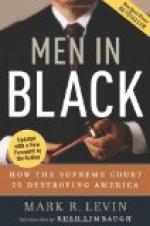The judge has been in his chambers taking a rest and enjoying a cigar. The judge always, when he is off the bench, is by courtesy said to be in chambers—other people might call it a room with an office desk, but the dignity surrounding a judge invests even the bare office room where he sits. It is named in the plural, even if it is only one ordinary room. He throws away his cigar. The lawyers or their assistants who have been lounging about the empty court-room, gossiping with one another and trying to evade the importunities of their clients, who insist upon speculating with them on the probable result, have been summoned to the bar. The judge takes his seat on the bench. The jury, marshalled by the court officer, file in. They are lined up in the jury-box.
“Gentlemen,” says the judge, “have you agreed upon a verdict?” “We have,” answers the foreman of the jury.
When the jury have first been locked in the jury-room they have probably immediately relaxed after the long strain of the trial. They were entitled to a smoke and to feel at their ease. Besides they know that if they finished their deliberations too early, they will be called on another case. It was nearly two when the judge finished his charge, so they have plenty of time to waste; for if they came back to the court-room before three they would be impaneled in another trial.
They have taken a straw vote to find out how the sentiment stood, not with the hope of arriving at a decision but by way of trying out the matter. The result stands nine for the plaintiff and three for the defendant. They light their cigars, for they came well prepared for the tedious hours in the jury-room.
The nine men look at the other three in disgust, the three look at the nine with contempt and then they begin to argue. The deliberations of the jury are always secret, their method of procedure is uncertain, and only the result of their deliberations appears in court. Nevertheless, it is only reasonable to speculate on how they have arrived at their verdict. Their verdict is the climax of the drama, the goal of the race, the award of victory. One side must win and the other be defeated. The psychology of the jury in reaching the verdict is the great mystery and the most intense interest of the trial. The judge does not know, the lawyers are unable to understand. There is a certain respect for the inviolate privacy of a jury-room. If trial lawyers could understand the method by which they arrive at their final announcement they would be far better equipped than by a study of the law for many years.
It is a question whether or not their actions are different from those of ordinary men outside a court-room. They have left the restraining influence of an uncomfortable and conspicuous position and have entered again into the attitude of mind of the everyday world. The control of the judge has disappeared. The lawyers are only memories. They have become only plain business men with something definite to do. They do not know how to do it and the discussion begins in a desultory way.




